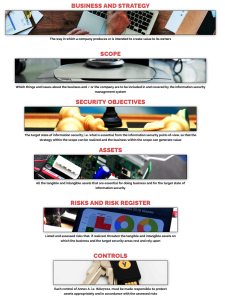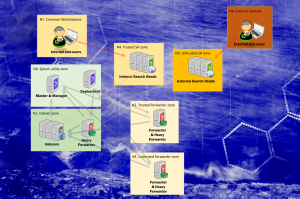As part of the ISO/IEC 27001 certification process, organizations must conduct regular internal audits to ensure compliance and identify areas for improvement. One common dilemma faced by businesses is whether to conduct these audits internally or engage an external company to do it.
Comparison
Implementing an effective information security management system (ISMS) is crucial for many organizations in today’s digital landscape. ISO/IEC 27001, the internationally recognized information security standard, provides a framework for managing and protecting sensitive information.
In this blog post, we will explore the pros and cons of two approaches to do an internal audit, helping you make an informed decision for your organization.
Leveraging in-house expertise
- Cost-effectiveness: Conducting internal audits can be more cost-effective in the long run, as it eliminates the need to hire external auditors or consultants. The resources required for training and maintaining an internal audit team are often outweighed by the cost savings achieved through not outsourcing.
- Familiarity: Internal audits offer the advantage of deep organizational knowledge. Internal auditors understand the company's processes, systems, and culture, enabling them to conduct audits that align closely with the specific needs and context of the organization.
- Continuous improvement: Internal auditors can play a vital role in driving continuous improvement. Being part of the organization, they have the opportunity to identify recurring issues and implement long-term solutions. This helps foster a culture of proactive risk management and information security awareness throughout the organization.
- Lack of objectivity: Internal auditors may face challenges in maintaining complete objectivity when assessing their own work or that of their colleagues. This bias could potentially compromise the effectiveness of the audit process, as certain issues might be overlooked or downplayed.
- Limited expertise and perspective: Internal audit teams may lack the breadth of experience and exposure to different industries and best practices that external auditors bring to the table. This can restrict the scope of the audit and limit the identification of potential risks or improvement opportunities.
- Internal politics: In addition to the challenge of maintaining complete objectivity in their work, internal auditors may also face constraints and reluctance to speak out candidly due to company internal politics. This may be driven, for example, by a fear of consequences.
Engaging outside expertise
- Objective and independent assessment: External auditors provide an unbiased perspective, as they are not directly involved in the day-to-day operations of the organization. This impartiality enhances the credibility of the audit findings and helps uncover potential vulnerabilities or non-compliance more effectively.
- Specialized knowledge and experience: Engaging external auditors allows organizations to tap into their specialized expertise and experience in ISO/IEC 27001 implementation and audit processes. These professionals stay up to date with the latest industry trends and can provide valuable insights and recommendations based on their exposure to various organizations.
- Benchmarking and industry best practices: External auditors bring a broader understanding of industry best practices, allowing organizations to benchmark their information security management against relevant standards and norms. This helps identify areas where the organization can improve its processes, policies, and controls.
- Internal politics won't be a problem: External auditors have no internal politics related reasons to not address a specific issue by its true name, because there is no need to be lenient, or need to fear consequences.
- Higher costs: Hiring an external audit firm or consultant can be expensive, particularly for smaller organizations with limited budgets. The cost associated with engaging external auditors needs to be carefully evaluated against the benefits gained.
- Familiarity with the organization: External auditors may lack an in-depth understanding of the organization's unique processes, systems, and culture. While they can learn about the organization during the audit process, this initial learning curve may require additional time and resources.
Guidelines for making the decision
Deciding whether to conduct ISO/IEC 27001 internal audits internally or engage an external company requires careful consideration of the pros and cons associated with each approach. Internal audits leverage internal expertise, cost-effectiveness, and promote continuous improvement. On the other hand, external audits offer objectivity, specialized knowledge, and industry benchmarking. Ultimately, the choice depends on the specific needs and resources of your organization.
For larger organizations with sufficient resources, a combination of both approaches might be beneficial. They can leverage their internal audit team for regular audits and engage external auditors periodically to gain an independent perspective and access specialized knowledge.
Regardless of the chosen approach, there are a few key considerations to ensure the effectiveness of ISO/IEC 27001 internal audits:
- Competence and training: Whether conducting internal audits or managing external auditors, it is crucial to have well-trained personnel with a thorough understanding of ISO/IEC 27001 requirements and audit processes. This ensures the audits are conducted accurately and consistently.
- Independence and objectivity: If internal audits are conducted, it is essential to establish independence and objectivity within the internal audit team. This can be achieved through appropriate reporting lines, segregation of duties, and the establishment of a strong internal control framework.
- Regular review and improvement: Internal audit processes should be subject to continuous review and improvement. This includes periodically assessing the effectiveness of the internal audit function, addressing any identified gaps, and incorporating lessons learned from external audits or industry best practices.
- Compliance with ISO/IEC 27001 requirements: Regardless of the approach chosen, the organization must ensure that the internal or external audit process aligns with ISO/IEC 27001 requirements. This includes defining audit criteria, conducting risk assessments, and documenting audit findings and corrective actions.
Conclusion
Ultimately, the decision to conduct ISO/IEC 27001 internal audits internally or engage an external company depends on factors such as the organization’s size, budget, internal expertise, and the need for independent assessments. Careful consideration of the pros and cons outlined in this blog post will help organizations make an informed choice that best suits their unique circumstances.
Whichever approach is selected, the goal should be to maintain a robust information security management system that protects sensitive data, mitigates risks, and demonstrates a commitment to safeguarding information assets.






